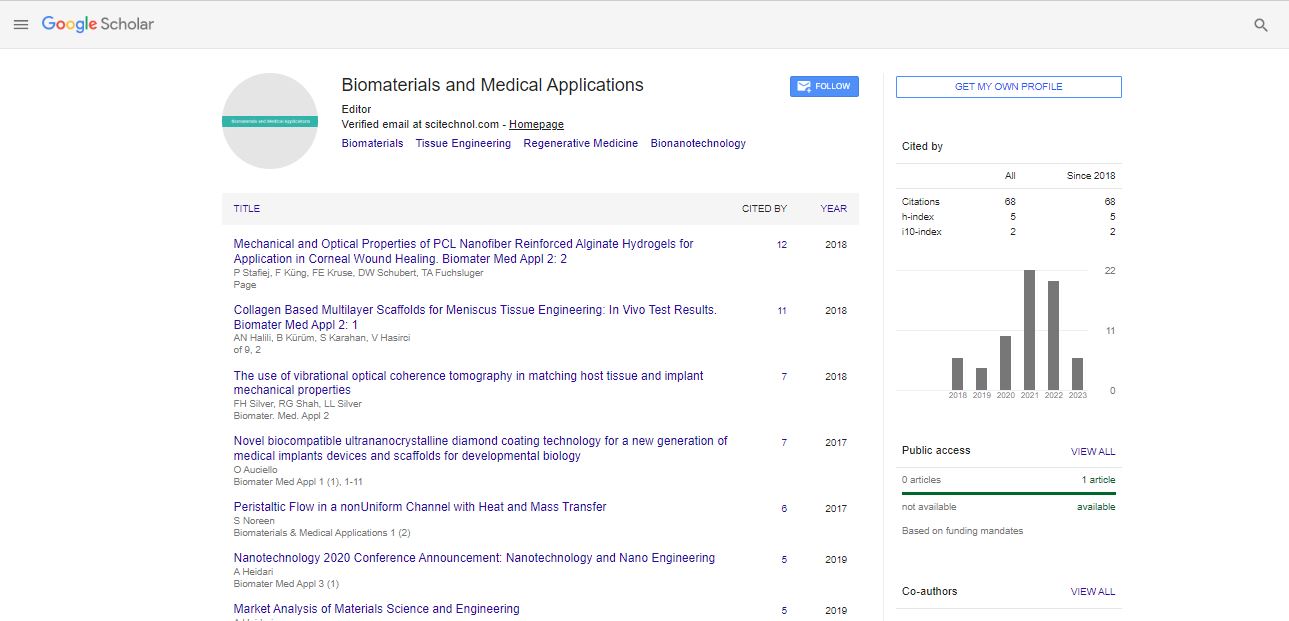Perspective, Biomater Med Appl Vol: 7 Issue: 1
Capabilities and Potential Advancement of Cardiovascular Implantable Devices
Ben Johnson*
Department of Cardiology, Vanderbilt University, Nashville, TN, USA
*Corresponding Author: Ben Johnson
Department of Cardiology
Vanderbilt University, Nashville
TN, USA
E-mail: johnsonb@yahoo.com
Received date: 15 February, 2023, Manuscript No. BMA-23-95670;
Editor assigned date: 17 February, 2023, Pre QC No. BMA-23-95670(PQ);
Reviewed date: 03 March, 2023, QC No. BMA-23-95670;
Revised date: 10 March, 2023, Manuscript No: BMA-23-95670(R);
Published date: 17 March, 2023, DOI: 10.35248/2577-0268.100511
Citation: Johnson B (2023) Capabilities and Potential Advancement of Cardiovascular Implantable Devices. Biomater Med Appl 7:1.
Description
Cardiovascular implantable devices have been essential in improving the quality of life for patients with heart conditions. From pacemakers to stents, these devices have saved countless lives and provided hope for individuals suffering from cardiovascular disease. In recent years, advancements in technology have further improved the capabilities and potential of cardiovascular implantable devices. Pacemakers are perhaps the most well-known cardiovascular implantable devices. They are small devices that are surgically implanted under the skin, usually in the chest area, to regulate the heartbeat. They use electrical impulses to regulate the heart rate and rhythm, and can be programmed to adjust to the patient's activity levels. In recent years, pacemakers have become more sophisticated with features like automatic adjustment to the patient's breathing rate and wireless communication with the patient's healthcare provider.
Another commonly used cardiovascular implantable device is the Implantable Cardioverter-Defibrillator (ICD). This device is similar to a pacemaker but also has the ability to detect and correct potentially life-threatening arrhythmias. ICDs use electrical shocks to reset the heart's rhythm and can also be programmed to send data wirelessly to the patient's healthcare provider. Stents are another important cardiovascular implantable device that are used to treat blocked or narrowed arteries. These tiny, wire mesh tubes are inserted into the affected artery and act as a scaffold, keeping the artery open and allowing blood to flow freely. In recent years, drug-eluting stents have become more popular. These stents release medication to prevent the artery from becoming blocked again, reducing the need for repeat procedures. The future potential of cardiovascular implantable devices is vast, with ongoing research and development focusing on improving the effectiveness and safety of existing devices and creating new ones. One area of research is in the development of bioresorbable stents. These stents are designed to dissolve over time, reducing the risk of long-term complications and allowing the artery to return to its natural state.
Implantable heart pumps, also known as Ventricular Assist Devices (VADs), are another area of research and development. These devices are used to help patients with heart failure by assisting the heart in pumping blood. Currently, VADs are used as a temporary solution while patients wait for a heart transplant. However, ongoing research aims to improve the durability and functionality of VADs, making them a long-term solution for patients with heart failure. Artificial hearts are another area of research and development. These devices would serve as a permanent solution for patients with end-stage heart failure who are not candidates for a heart transplant. While there have been significant advancements in this area, challenges such as durability, infection risk, and the need for external power sources still need to be addressed.
In conclusion, cardiovascular implantable devices have important in improving the quality of life for patients with heart conditions. Advancements in technology have improved the capabilities and potential of these devices, with ongoing research and development aimed at creating new and innovative solutions. As technology continues to evolve, the future of cardiovascular implantable devices looks promising, with the potential to save even more lives and provide hope for patients with heart conditions.
 Spanish
Spanish  Chinese
Chinese  Russian
Russian  German
German  French
French  Japanese
Japanese  Portuguese
Portuguese  Hindi
Hindi 